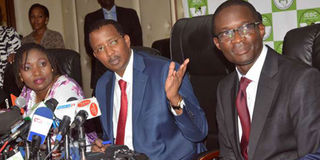With the electoral team still in office, why not call off the polls

Independent Electoral and Boundaries Commission (IEBC) Chairman Isaac Hassan (centre) and CEO Ezra Chiloba (right) and Vice Chairperson Lilian Mahiri-Zaja during a press briefing at the IEBC offices in Nairobi on March 24, 2016. Major stakeholders in the country, save for Jubilee, have called for a re-constitution of the widely discredited electoral commission. PHOTO | ANTHONY OMUYA | NATION MEDIA GROUP
What you need to know:
- Major stakeholders in the country, save for Jubilee, have called for a re-constitution of the widely discredited electoral commission.
- Recently the National Council of Churches of Kenya added its voice to the growing realisation that we will be courting danger and chaos if the present commission handles next year’s election, coming after the Catholic Bishops had similarly chimed in.
- The calls for the disbandment of the Independent Electoral and Boundaries Commission (IEBC) started with civil society activists, after making objective analyses of the situation, bearing in mind our past on elections.
- The electoral commission mishandled the last elections with malleable voter registers, non-functioning electronic safeguards, suspect procurements and public statements of bias against some candidates.
Major stakeholders in the country, save for Jubilee, have called for a re-constitution of the widely discredited electoral commission.
Recently the National Council of Churches of Kenya added its voice to the growing realisation that we will be courting danger and chaos if the present commission handles next year’s election, coming after the Catholic Bishops had similarly chimed in.
The calls for the disbandment of the Independent Electoral and Boundaries Commission (IEBC) started with civil society activists, after making objective analyses of the situation, bearing in mind our past on elections.
Cord joined in, at first reluctantly, and then seemed to veer off for some reason, before coming back on board.
The electoral commission mishandled the last elections with malleable voter registers, non-functioning electronic safeguards, suspect procurements and public statements of bias against some candidates.
Reconstituting the commission must extend to key staff.
It is amazing that more than a year since the new chief executive was appointed, the same senior staff remains having been part and parcel of the 2013 shenanigans.
DUE PROCESS
Mr Uhuru Kenyatta’s view is that the law should be followed. He is right. But the public pressure being exerted is meant to prompt a legal solution.
The easiest way would be for the Commissioners to resign in the public interest.
But in a Kenya where the Executive has made public interest irrelevant with appointments and firings, this is unlikely.
Lest we forget, much as Mr Kenyatta stresses the constitutional way of doing things, he has a particular record of getting constitutional office holders to resign when it suits him.
Remember Michael Gichangi, the former spy chief? And the anti-corruption commissioners who were arm-twisted to leave?
The problem is that if we have to go through the process of creating a tribunal, we may not be finished by August next year.
First Parliament will need to vote on a tribunal, which will depend on what Mr Kenyatta and Mr William Ruto direct their lackey Members of Parliament.
And a contentious parliamentary debate will only raise tensions and cement, even more, the deep and widening divisions and suspicions in the country.
Even if Parliament agrees, the Commissioners could put legal obstacles in the courts to derail the process, as we have seen Samuel Gichuru and Chris Okemo do so successfully on their extradition case to Jersey to face corruption charges.
So maybe we need to rethink this again, especially in the context of recent elections in Uganda, Ethiopia, Republic of Congo and Chad.
BIASED ELECTION BODIES
In these countries, the election bodies were so blatantly biased that the result was pre-determined: The only question was deciding the margin of victory in order to look respectable, and in Ethiopia’s case the regime decided that a 100 percent victory was not outside the realm of reality!
For good measure, the regimes brought out the troops in a show of force, and then, just to be certain, blocked off Internet and cell phone reception in the entire country for vague and uncertain “security” reasons.
If elections can’t be about a fair, transparent and legitimate chance to choose the leaders we want, if results are pre-determined and our ability to express, mobilise and seek redress is taken away, why should we be spending all the billions that we do?
Why should we give regimes a fig leaf to cover the nakedness of their dictatorial and illiberal status by giving them a chance to call themselves “elected” when they, and we, know they are not?
So, perhaps if we can’t have a new electoral commission beginning of August; if we don’t have assurances that our Internet, Whatsapp and cell phones will not be turned off on election day and after; if we are not assured that security forces will not be used to stifle our freedom of assembly and expression; and if the electoral commission still has those senior staffers with their past records, then maybe we should just call off the elections, and simply coronate all the existing leaders in their current positions.
It will surely save us a whole lot of money and allow each of us the chance to decide on our next steps.





